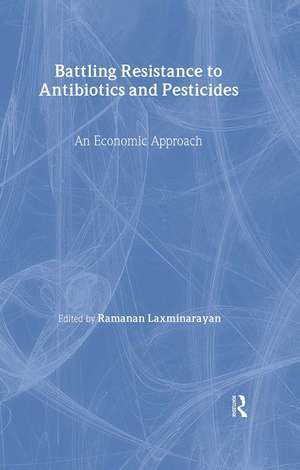Battling Resistance to Antibiotics and Pesticides: An Economic Approach
Editat de Ramanan Laxminarayanen Limba Engleză Hardback – 26 dec 2002
Preț: 601.69 lei
Preț vechi: 841.66 lei
-29% Nou
Puncte Express: 903
Preț estimativ în valută:
115.17€ • 125.14$ • 96.81£
115.17€ • 125.14$ • 96.81£
Comandă specială
Livrare economică 31 martie-14 aprilie
Doresc să fiu notificat când acest titlu va fi disponibil:
Se trimite...
Preluare comenzi: 021 569.72.76
Specificații
ISBN-13: 9781891853517
ISBN-10: 1891853511
Pagini: 320
Dimensiuni: 152 x 229 x 24 mm
Greutate: 0.7 kg
Ediția:New.
Editura: Taylor & Francis
Colecția Routledge
Locul publicării:Oxford, United Kingdom
ISBN-10: 1891853511
Pagini: 320
Dimensiuni: 152 x 229 x 24 mm
Greutate: 0.7 kg
Ediția:New.
Editura: Taylor & Francis
Colecția Routledge
Locul publicării:Oxford, United Kingdom
Public țintă
Academic and Professional Practice & DevelopmentCuprins
ContributorsAbout This BookIntroduction: On the Economics of ResistancePART I. Issues of Optimal Management of Resistance1. Dynamics of Antibiotic Use: Ecological versus Interventionist Strategies To Manage Resistance to AntibioticsJames E. Wilen and Siwa Msangi2. Using Antibiotics When Resistance Is RenewableRobert Rowthorn and Gardner M. Brown3. Value of Treatment Heterogeneity for Infectious DiseasesRamanan Laxminarayan and Martin L. WeitzmanCommentary: To Take or Not to Take the Antibiotic?James N. SanchiricoCommentary: Same Infection, Same Time, Same Antibiotic?Stephen W. Salant4. Pest Mobility, Market Share, and the Efficacy of Refuge Requirements for Resistance ManagementSilvia Secchi and Bruce A. BabcockCommentary: Need for Direct Collaboration between Economists and BiologistsFred GouldPART II. The Impact of Resistance5. The Impact of Resistance on Antibiotic Demand in Patients with Ear InfectionDavid H. Howard and Kimberly J. Rask Commentary: Measuring the Cost of ResistanceRamanan Laxminarayan6. What Can We Learn from the Economics of Pesticides? Impact Assessment of Genetically Modified PlantsHermann Waibel, Jan C. Zadoks, and Gerd FleischerCommentary: The Role of Ecosystem Complexity in Genetically Modified OrganismsKarl Seeley7. Elements of Economic Resistance Management Strategies Some Empirical Evidence from Case Studies in GermanyGerd Fleischer and Hermann WaibelCommentary: Can We Justify Resistance Management Strategies for Conventional Pesticides?Fred Gould8. Pesticide Resistance, the Precautionary Principle, and the Regulation of Bt Corn: Real and Rational Option Approaches to DecisionmakingBeno t Morel, R. Scott Farrow, Felicia Wu, and Elizabeth A. Casman9. Resistance Economics of Transgenic Crops under Uncertainty: A Real Option ApproachJustus WesselerCommentary: Economics of Transgenic Crops and Pesticide Resistance: An Epidemiological PerspectiveChristopher A. GilliganPART III. The Behavior of Firms10. An Economic Model of a Genetic Resistance Commons: Effects of Market Structure Applied to Biotechnology in AgricultureDouglas NoonanCommentary: Does the Monopolist Care about Resistance?Carolyn Fischer11. The Interaction of Dynamic Problems and Dynamic Policies: Some Economics of BiotechnologyTimo Goeschl and Timothy Swanson12. Industrial Organization and Institutional Considerations in Agricultural Pest Resistance ManagementJennifer Alix and David ZilbermanCommentary: Strategic Issues in Agricultural Pest ManagementR. David SimpsonIndexAbout the Editor
Notă biografică
Ramanan is a senior fellow at Resources for the Future in Washington, DC. His research includes the integration of epidemiological models of infectious disease transmission and the economic analysis of public health problems. He has worked with the World Health Organization on evaluating malaria treatment policy in Africa, and recently served on a National Academy of Science/Institute of Medicine Committee on the Economics of Anti-malarial Drugs. He teaches international health policy in the Johns Hopkins Bloomberg School of Public Health, and development economics at the Johns Hopkins University‘s Paul H. Nitze School of Advanced International Studies.
Recenzii
'...a welcome addition to the small existing literature on the effects of antibiotic and pesticide resistance. It provides a good review of both the analytical tools used to study the effects of resistance, as well as of the economic policy measures that might be available to fight resistance to antibiotics and pesticides.'Environment International'Interesting and diverse, the contents reflect the beginnings of an economics of resistance that is likely to grow in importance.'Marc Lipsitch, Harvard School of Public Health
